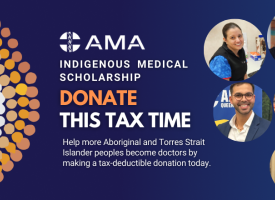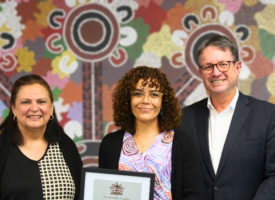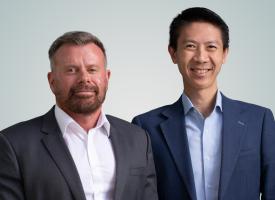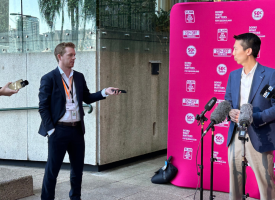Transcript - Dr Gannon - ABC Radio Alice Springs - Health Outcomes for Indigenous Australians
Transcript: AMA President, Dr Michael Gannon, ABC Radio Alice Springs, Breakfast with Stewart Brash, Wednesday 18 April 2018
Subject: Health Outcomes for Indigenous Australians
STEWART BRASH: We go over the health statistics and the health outcomes for Aboriginal Australians, especially here in Central Australia, quite frequently. The story, as a whole, can often look daunting and depressing. You look at health outcomes in terms of longevity. You look at the rates of renal failure and renal disease in a place like Central Australia - we have the highest rates in the Southern Hemisphere, if not the world. We have the biggest renal facilities in the Southern Hemisphere. These sorts of things aren't necessarily things to be proud of, but we need to deal with the real issues; the extensive chronic problems we have in a place like Alice Springs. So what can the Federal President of the AMA say about those, and maybe what are some of the things we should be doing differently? The question is we all know the problem. Solutions is really what we still want to hear about.
Michael Gannon, Dr Michael Gannon, good morning.
MICHAEL GANNON: Good morning, Stewart.
STEWART BRASH: I suppose I painted a snapshot which can be seen as quite depressing when we talk about health outcomes, especially longevity, chronic disease, the problems with alcohol abuse. And yes, we talk about now in more recent times, things like FASD, and we don't even have a real idea of how bad FASD is in the communities here. You've come to go and look at Kintore and Utopia. Now, were those new experiences for you, to actually go to remote communities like that?
MICHAEL GANNON: Certainly very new to me. I mean, I'm from Perth, and so Aboriginal health issues are not foreign to Western Australia. It's huge, huge distances, and providing services to people often literally hundreds of kilometres away is not new.
But these communities are unique, and I suppose one of the issues that we've become more conscious of as well is how mobile these communities are, and some health problems we see cross the border into Western Australia, into South Australia, into Queensland. This requires a novel approach to delivering health care.
STEWART BRASH: Absolutely. Well, you were up at Kintore, and we've got a sibling community of Kiwirrkurra further in to Western Australia, you go even further to Kunawarritji, the Canning Stock Route. All peoples are connected by language and it's not like State - State borders don't really stop that at all. What did you find? What was your experience of going into both Utopia and Kintore?
MICHAEL GANNON: Well, two different communities, two very different communities and different to Alice, and then in turn, different to Australia's major cities. But some of the themes are recurring, and they are themes in Indigenous health, whether we're talking about Western Sydney or we're talking about remote communities here in Central Australia.
The thing that drives the problems with the health outcomes are social determinants of health. And although we see some fabulous stories of, for example, delivering haemodialysis services to people in these remote areas, although we see some fabulous professionals who use the Royal Flying Doctor Service or use hospitals in Adelaide and Darwin to deliver the sub-specialist care at the end stage, where we really need to be targeting our interventions is at housing, at water, at sanitation. Those are the things which determine whether or not you can improve someone's health.
STEWART BRASH: Well, we've got - I don't know if you want to step into the stoush between the Federal Government and the Northern Territory Government over remote housing. We've got that sort of stoush where it's all about leasing- [indistinct] out of the politics. So how far does the AMA buy into those sort of conversations, because if housing is a major determinant - as you say - of illness and chronic illness, what do you say to the Federal and Territory Governments who can't even work out sub-leasing in remote communities? You're going to buy into that one?
MICHAEL GANNON: Well, look, I think we say: sort it out. So, as recently as last week, we - by no real intent of our own - got involved in the partisan debate over funding of the NDIS. Now, our answer to the Labor Party, to the Coalition Government, is just get on and fix it. Now, these things are difficult. We know that Commonwealth-State relationships are difficult. I'm president of a Federal organisation, I don't always agree with my State Presidents, so we understand the contention that's involved there. But we're talking about the lives of Australians and we ask politicians to seek common ground wherever possible, and get on and deliver the social services and the health services that people need.
STEWART BRASH: Politically, I know Warren Snowdon, I think, has been showing you around some of these communities. You look politically, Lingiari's one MHR, one sort of Federal seat. You've got the vast area of the Kalgoorlie seat in Western Australia. Politically, they don't add up to much, so therefore politically, people, governments look where the dollars are and look where - they want to get re-elected, they put dollars where they're going to have more bang. By that very rough arithmetic, we're not in position to really put a great call on governments to act. I mean, we haven't seen a big investment in, say, things like health since the intervention, and you might like to say - some people said - the intervention was a lot of money which fell into the sand, but it didn't have very much benefit in the end. So what do you say to Federal Parliamentarians who go: well, it's one seat?
MICHAEL GANNON: Well, I suppose that's one of the things about the Australian Medical Association is that we do have unique reach. I've got direct access to Minister Hunt, to Minister Wyatt, to the Prime Minister, to the Opposition Leader, to talk to them about these things. We have boots on the ground, if you'll forgive that analogy. So we represent doctors, whether they're paediatricians or GPs, psychiatrists, surgeons, everywhere they work. And we take this role, shining a light on the health problems in hidden areas of Australia, very seriously.
You're exactly right. If you want to win the election, you've got to look at western Sydney, you've got to look at Melbourne, you've got to concentrate –
STEWART BRASH: [Interrupts] You've got to look at Perth, you've got to look at Brisbane. You've got to look at- and even regional areas, but I don't know how many of them go: oh, let's worry about Alice Springs.
MICHAEL GANNON: Well, that's right. So governments have a moral duty to act on behalf of all their citizens, wherever they live, but hard political decisions are made in this country. And although we live on this vast land mass, the comprehension of which many Australians I don't think have - I do, I fly across it enough to know exactly how big this country is. But we do have very sparse, separated populations. Of course, you know, three-quarters of our population lives in five cities.
STEWART BRASH: What do you make of the capacity of the Northern Territory, and the Federal Government, to deliver health services to remote Indigenous Australians - just remote Australians in general - given that we've just had a cut in our GST take? We've lost another $136 million for the next financial year. So much of the money which we receive from the Federal Government is for Indigenous disadvantage and we're getting less and less of it, while other States and Territories seem to be getting more. I mean, is there a funding model which needs to concentrate on these health issues apart from how we cut up the GST?
MICHAEL GANNON: Well, certainly one of the things we would advocate for is needs-based funding. It's only in recent years we've reached the point, for example, that Indigenous Australians were getting the same amount of health dollars spent on them. When we look at the needs they have –
STEWART BRASH: Really? We always talk about how many billions of dollars are ending up in Indigenous health and feeling that it's not having an impact.
MICHAEL GANNON: Well, we've just got so far to go, and the truth is that if we looked at needs-based funding, like in terms of the pathology they have, in terms of diabetes, rheumatic heart disease, end stage renal failure, chronic otitis media and ear health, we need to probably spend two-and-a-half or three times as much. How we spend it, that needs to be smart –
STEWART BRASH: Because that's going to be Federal money, really. It's not going to come from the Northern Territory Government who doesn't have the capacity to raise that sort of money.
MICHAEL GANNON: Well, that's right. I mean, it won't surprise you to hear a West Australian might have an opinion on the GST -
STEWART BRASH: I know, you get very little of the take. About 35, 40 cents on the dollar you produce.
MICHAEL GANNON: Yeah, so that's right. But we need to work out ways that are fair, that deliver services to where they're needed. We do live in one country. The Federal system's not perfect but we have that sort of government in Australia. In Britain, money goes from the south to the north. We see similar things in different parts of the world.
STEWART BRASH: What about alcohol? Alcohol is one of the great issues that has a major impact on people living in Alice Springs, in Tennant Creek, and remote communities. Does the AMA have a policy on the fact- we just had a big alcohol review, the Riley Review. Did you have a point of view on the role of alcohol in- well, certainly preventing alcohol harm and alcohol related illness?
MICHAEL GANNON: Well of course, I visited two dry communities this week, and that's not the answer for everywhere. That's clearly not the answer for Alice Springs or Tennant Creek, but I think that all across Australia, not just in the Territory, we need to look at our relationship with alcohol. That's going to be a difficult conversation for Australians.
STEWART BRASH: So, now we're being told that 10 standard drinks a week, I think, is how much we should consume. At most.
MICHAEL GANNON: Yeah. Well, we need to look at the evidence. So the NHMRC, the peak scientific body, is looking at their guidelines, and I suspect what we tell people is safe is headed south. Now, they're difficult conversations because the use of alcohol is completely inculcated in our culture. We need to change the way we think about it, the way we use it, and that will take time.
STEWART BRASH: Dr Di Natale, the head of the Greens and former member of the AMA, was calling for the decriminalisation of cannabis yesterday. What's your thoughts on that? Is it the way to go to try and take out the criminal element in terms of cannabis?
MICHAEL GANNON: Well, certainly we support decriminalisation and taking the criminal element out is extremely important. But as for full legalisation, we think that’s a step too far. We’re talking about a substance that has serious adverse physical and mental health aspects.
STEWART BRASH: Okay. Dr Gannon, thank you so much.
MICHAEL GANNON: It’s been a pleasure.
19 April 2018
CONTACT: John Flannery 02 6270 5477 / 0419 494 761
Maria Hawthorne 02 6270 5478 / 0427 209 753
Follow the AMA Media on Twitter: http://twitter.com/ama_media
Follow the AMA President on Twitter: http://twitter.com/amapresident
Follow Australian Medicine on Twitter: https://twitter.com/amaausmed
Like the AMA on Facebook https://www.facebook.com/AustralianMedicalAssociation



